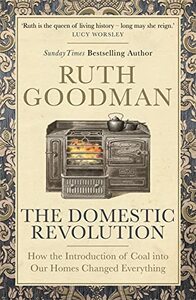You need to sign in or sign up before continuing.
Take a photo of a barcode or cover
informative
lighthearted
relaxing
medium-paced
☆☆☆1\2 first half was very informative but a little dry, but the second half was very interesting to read.
informative
medium-paced
informative
medium-paced
informative
medium-paced
Absolutely spectacular book that traces the changes in everyday cooking and cleaning in Britain from the middle ages to the Edwardians -- which doesn't sound that interesting, but Goodman is an enthralling storyteller. Not only that, but she has a wonderful way of looking at the small and expanding it out to encompass an entire way of life. Has a lot of fascinating tidbits for the medieval reenactor, and really interesting things to say about alternate methods of cleaning than soap. Relates the astonishing impact on the landscape from the change to coal, and the colonial oppression that coincides with the rise of soap. I don't necessarily believe that every theory in this book is true, but I appreciate a tidy history and a compelling argument, and this book has those in spades.
Also, I totally want to make oatmeal bars on our next medieval camping trip.
Advanced Readers Copy provided by Edelweiss.
Also, I totally want to make oatmeal bars on our next medieval camping trip.
Advanced Readers Copy provided by Edelweiss.
A comprehensive view of the impact of coal in the domestic environment. The transition from wood to coal was a significant advancement in some ways, but a tedious challenge in others. While the first three chapters were necessary to describe wood burning, peat and other methods of producing heat for home use, my interest did not peak until after chapter 4 when the author’s claims of the extent of coal’s influence on domestic life were finally explained. Previously, I did not connect the development of such industries as Soap making with the advent of coal in the home. The alterations in cooking methods was also a new construct. In any case, a historical and social analysis of a commodity such as coal is always a favorite science and technology read for me.
My mom took one look at this book and said, "How can you have a whole book about the change to using coal? It seems like that should take about a chapter." Well, Ruth Goodman, who has spent much of her life participating in historical reenactments of domestic life, managed to fill 300 pages with very interesting details about "the coal revolution." I never realized this before, but England alone switched to nearly exclusive domestic coal use in the late 1500s, while continental Europe and the New World continued with wood-burning for another 200+ years. It may seem a small change, but it drastically impacted British cuisine, cooking implements, laundry, and general cleanliness in radical ways.
Having only done simple campfire cooking over a fire, I didn't realize there was a whole art to regulating temperatures and preparing a variety of foods over wood embers. Nor did I realize the huge change caused by the substitution of more diffuse and hotter-burning coal, which required completely different techniques, and led to the popularization of different types of dishes, ultimately producing what is thought of as "English Cuisine." Different types of brass and iron cookware were required and new "fire furniture" was needed to hold and manage the coals.
I think the biggest change, though, came with cleanliness, or lack thereof. While wood fires can be smokey, coal burning gives off greasy particles that create a film on everything they touch. Traditional cleaning with brushes and ash, with very little water, was ineffective at removing this new dirtiness. Thus came the rise of soap, and with it the gradual connection of British soap-led sanitation with superior moral and ethnic cleanliness. As the British led the Industrial Revolution and expanded their Empire, use of coal and soap were proselytized, adding customers to burgeoning British industries.
Methods for doing laundry changed as well, with large quantities of soap and hot water and scrubbing now replacing lye (from wood ash) and cold rinse. Overall, Goodman comments that the switch to coal created much more work for women, and likely contributed to Victorian ideas of "a woman's place" in the home, as she now had little remaining time for outside chores. I can't imagine a change that presented us with MORE work for the same basic result being embraced today, but that just goes to show how little influence women had in the 15- and 1600s. Still, I suppose it was overall a good thing that we stopped burning wood, or there would be no trees left....
Goodman makes some interesting points regarding the current transition underway as we move from the use of fossil fuels toward new greener energy. How will this change shift our domestic chores and behaviors? And what other modifications to our lives will a seemingly simple fuel change bring?
3.5 stars.
Having only done simple campfire cooking over a fire, I didn't realize there was a whole art to regulating temperatures and preparing a variety of foods over wood embers. Nor did I realize the huge change caused by the substitution of more diffuse and hotter-burning coal, which required completely different techniques, and led to the popularization of different types of dishes, ultimately producing what is thought of as "English Cuisine." Different types of brass and iron cookware were required and new "fire furniture" was needed to hold and manage the coals.
I think the biggest change, though, came with cleanliness, or lack thereof. While wood fires can be smokey, coal burning gives off greasy particles that create a film on everything they touch. Traditional cleaning with brushes and ash, with very little water, was ineffective at removing this new dirtiness. Thus came the rise of soap, and with it the gradual connection of British soap-led sanitation with superior moral and ethnic cleanliness. As the British led the Industrial Revolution and expanded their Empire, use of coal and soap were proselytized, adding customers to burgeoning British industries.
Methods for doing laundry changed as well, with large quantities of soap and hot water and scrubbing now replacing lye (from wood ash) and cold rinse. Overall, Goodman comments that the switch to coal created much more work for women, and likely contributed to Victorian ideas of "a woman's place" in the home, as she now had little remaining time for outside chores. I can't imagine a change that presented us with MORE work for the same basic result being embraced today, but that just goes to show how little influence women had in the 15- and 1600s. Still, I suppose it was overall a good thing that we stopped burning wood, or there would be no trees left....
Goodman makes some interesting points regarding the current transition underway as we move from the use of fossil fuels toward new greener energy. How will this change shift our domestic chores and behaviors? And what other modifications to our lives will a seemingly simple fuel change bring?
3.5 stars.
informative
fast-paced
informative
medium-paced




